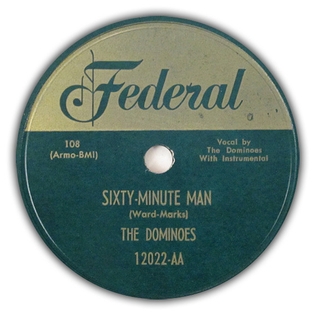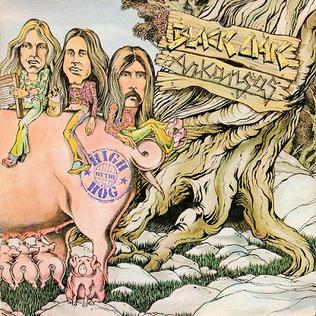Related Research Articles

Delores LaVern Baker was an American rhythm and blues singer who had several hit records on the pop charts in the 1950s and early 1960s. Her most successful records were "Tweedle Dee" (1955), "Jim Dandy" (1956), and "I Cried a Tear" (1958).
The Turbans were an American doo-wop vocal group that formed in Philadelphia, Pennsylvania in 1953. The original members were: Al Banks, Matthew Platt, Charlie Williams (baritone), and Andrew "Chet" Jones (bass). They came from Downtown Philadelphia.

Black Oak Arkansas is an American Southern rock band named after the band's hometown of Black Oak, Arkansas. The band reached the height of its fame in the 1970s, charting ten albums. Their style is punctuated by multiple guitar players and the raspy voice and on-stage antics of vocalist Jim "Dandy" Mangrum.
The Ravens were an American R&B vocal group, formed in 1946 by Jimmy Ricks and Warren Suttles. They were one of the most successful and most influential vocal quartets of the period, and had several hits on the R&B chart in the late 1940s and early 1950s.
The Mello-Moods were an American R&B musical ensemble, operating from the late 1940s to mid-1950s.

The Del-Vikings were an American doo-wop musical group that recorded several hit singles in the 1950s and continued to record and tour with various lineups in later decades. The group is notable for the hit songs "Come Go with Me" and "Whispering Bells", and for having been a successful racially mixed musical group during a period of time when such groups were rare.
The Harptones are an American doo-wop group, which formed in Manhattan in 1953.

"Tweedlee Dee" is a rhythm and blues novelty song with a Latin-influenced riff written by Winfield Scott for LaVern Baker and recorded by her at Atlantic Records' studio in New York City in 1954. It was her first hit, reaching number 4 on Billboard magazine's R&B chart and number 14 on its pop chart. It was Scott's first commercially successful song.

"Shop Around" is a song originally recorded by the Miracles on Motown Records' Tamla subsidiary label. It was written by Miracles lead singer Smokey Robinson and Motown Records founder Berry Gordy. It became a smash hit in 1960 when originally recorded by the Miracles, reaching number one on the Billboard R&B chart, number one on the Cashbox Top 100 Pop Chart, and number two on the Billboard Hot 100 chart. It was the Miracles' first million-selling hit record, and the first-million-selling hit for the Motown Record Corporation.

"Why Do Fools Fall in Love" is a debut single by American rock and roll band Frankie Lymon & the Teenagers that was released on January 10, 1956. It reached No. 1 on the R&B chart, No. 6 on Billboard's Pop Singles chart, and No. 1 on the UK Singles Chart in July. Many renditions of the song by other artists have also been hit records in the U.S., including versions by the Diamonds, the Beach Boys, and Diana Ross.

The Chords were an American doo-wop vocal group formed in 1951 in The Bronx, New York, known for their 1954 hit "Sh-Boom", which they wrote. It is the only song they created that reached mainstream popularity.

Billy Ward and his Dominoes were an American R&B vocal group. One of the most successful R&B groups of the early 1950s, the Dominoes helped launch the singing careers of two notable members, Clyde McPhatter and Jackie Wilson.

"Sixty Minute Man" is an R&B record released on Federal Records in 1951 by the Dominoes. It was written by Billy Ward and Rose Marks and was one of the first R&B hit records to cross over to become a hit on the pop chart. It is regarded as one of the most important of the recordings that helped generate and shape rock and roll.
The Charts were an American doo-wop group of the 1950s, most famous for their recording "Deserie".

"Your Baby Doesn't Love You Anymore" is a song originally recorded and made a minor hit by Ruby & the Romantics in 1965. It appeared on their Greatest Hits album, and was released as a single on Kapp Records K-665 in April of that year. On The Romantics' original version, the song's composer is listed as Lawrence (Larry) Weiss. Although it was originally a B-side to the standard "We'll Meet Again", "Your Baby" received considerably more R&B radio airplay, but did not reach the Billboard Hot 100, only managing #8 on the Bubbling Under chart.

High on the Hog is the fourth studio album by American southern rock band Black Oak Arkansas, released in 1973 by Atco Records. It is known for its cover of the LaVern Baker song "Jim Dandy", which reached number 25 on the US Billboard Hot 100.

Lincoln R. Chase was an American songwriter and occasional recording artist. As a writer, his most notable songs were "Such a Night", "Jim Dandy", and several of Shirley Ellis' hits in the early 1960s including "The Name Game" and "The Clapping Song".
The Monotones were a six-member American doo-wop vocal group in the 1950s. They are considered a one-hit wonder, as their only hit single was "The Book of Love", which peaked at No. 5 on the Billboard Top 100 in 1958.

"Rock and Roll Heaven" is a song written by Alan O'Day and Johnny Stevenson, popularized by The Righteous Brothers. It is a paean to several deceased singers such as Jimi Hendrix, Janis Joplin, and Otis Redding, and has been rewritten a number of times to include other singers. The song was first recorded by the band Climax in 1973, but it failed to chart. It was then covered by The Righteous Brothers in 1974 and reached number three on the U.S. Billboard Hot 100.
The Cues were an American R&B vocal group, who recorded both under their group name and under various other names as backing singers for artists on Atlantic Records and other labels in the 1950s. They recorded as the Rhythmakers with Ruth Brown; as the Blues Kings with Big Joe Turner; the Gliders with LaVern Baker; and as the Ivory Tones with Ivory Joe Hunter. Independently, they also recorded as the Four Students. Researcher Marv Goldberg has claimed that "because of their unique role in the recording industry, The Cues probably participated in more hit records than any other group."
References
- ↑ LaVern Baker - Real Gone Gal, 1984, retrieved 2022-05-02
- 1 2 3 Goldberg, Marv. "Lavern Baker". Uncamarvy.com. Retrieved 2010-09-09.
- ↑ The RS 500 Greatest Songs of All Time, Rolling Stone, 2004-12-09, archived from the original on 2008-06-21, retrieved 2010-09-09
- ↑ John Laughter (31 July 2015). "Top 40 Saxophone Solos". Cafe Saxophone. Retrieved 6 November 2015.
- ↑ John H. Beck (2013-11-26). Encyclopedia of Percussion. Routledge. p. 330. ISBN 9781317747680 . Retrieved 2016-08-29.
- ↑ "Marv Goldberg's R&B Notebooks - CUES". www.uncamarvy.com. Archived from the original on 24 June 2010. Retrieved 17 January 2022.
- ↑ Harper, Douglas. "jim-dandy". Online Etymology Dictionary . Retrieved 1 February 2012.
- ↑ Breithaupt, Don; Breithaupt, Jeff (October 15, 1996). "Planet of the Apes: Hard Rock". Precious and Few - Pop Music in the Early '70s. St. Martin's Griffin. p. 106. ISBN 031214704X.
- ↑ "RPM Top 100 Singles - February 23, 1974" (PDF).
- ↑ "RPM Top 200 Singles of 1974 - December 28, 1974" (PDF).
- ↑ "www.allmusic.com". allmusic.com. Retrieved November 29, 2023.
- ↑ "www.discogs.com". discogs.com. Retrieved November 29, 2023.